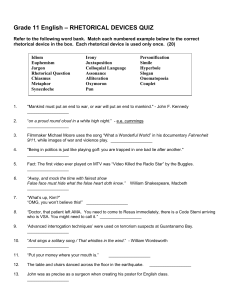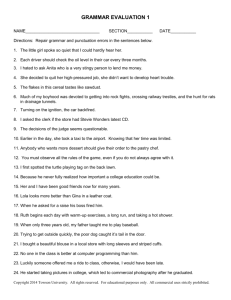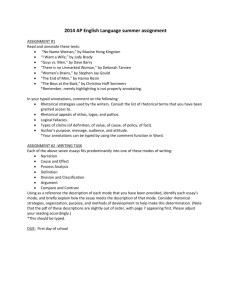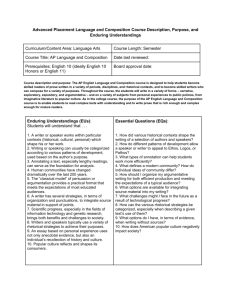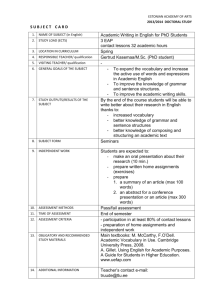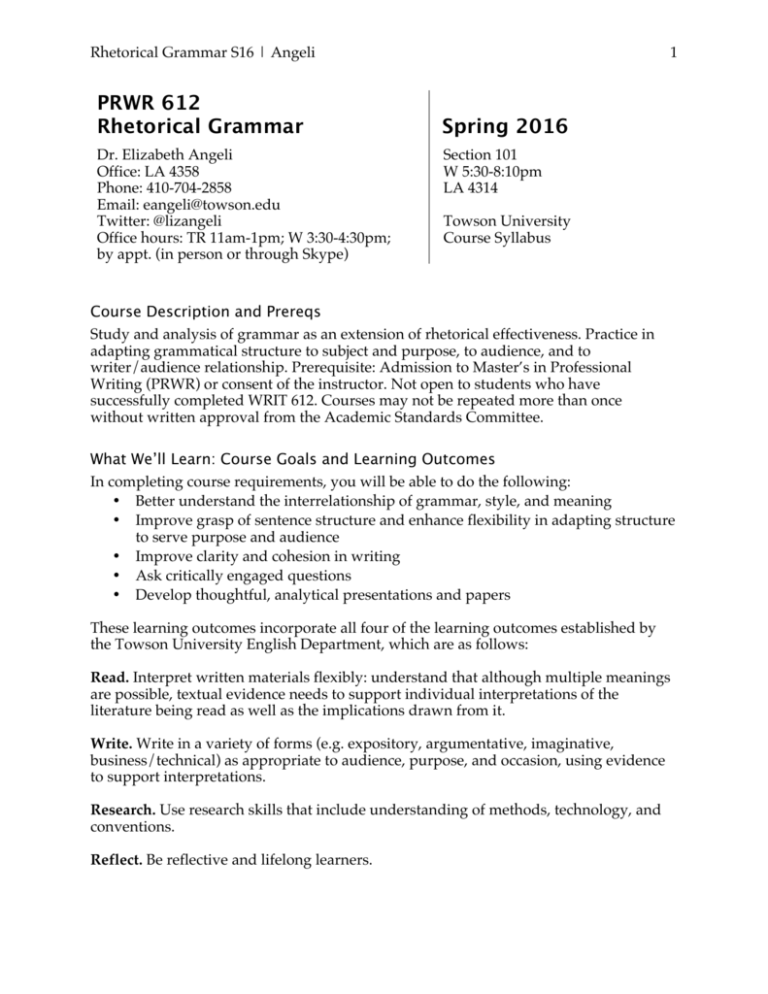
Rhetorical Grammar S16 | Angeli
PRWR 612
Rhetorical Grammar
Dr. Elizabeth Angeli
Office: LA 4358
Phone: 410-704-2858
Email: eangeli@towson.edu
Twitter: @lizangeli
Office hours: TR 11am-1pm; W 3:30-4:30pm;
by appt. (in person or through Skype)
1
Spring 2016
Section 101
W 5:30-8:10pm
LA 4314
Towson University
Course Syllabus
Course Description and Prereqs
Study and analysis of grammar as an extension of rhetorical effectiveness. Practice in
adapting grammatical structure to subject and purpose, to audience, and to
writer/audience relationship. Prerequisite: Admission to Master’s in Professional
Writing (PRWR) or consent of the instructor. Not open to students who have
successfully completed WRIT 612. Courses may not be repeated more than once
without written approval from the Academic Standards Committee.
What We’ll Learn: Course Goals and Learning Outcomes
In completing course requirements, you will be able to do the following:
• Better understand the interrelationship of grammar, style, and meaning
• Improve grasp of sentence structure and enhance flexibility in adapting structure
to serve purpose and audience
• Improve clarity and cohesion in writing
• Ask critically engaged questions
• Develop thoughtful, analytical presentations and papers
These learning outcomes incorporate all four of the learning outcomes established by
the Towson University English Department, which are as follows:
Read. Interpret written materials flexibly: understand that although multiple meanings
are possible, textual evidence needs to support individual interpretations of the
literature being read as well as the implications drawn from it.
Write. Write in a variety of forms (e.g. expository, argumentative, imaginative,
business/technical) as appropriate to audience, purpose, and occasion, using evidence
to support interpretations.
Research. Use research skills that include understanding of methods, technology, and
conventions.
Reflect. Be reflective and lifelong learners.
Rhetorical Grammar S16 | Angeli
2
Information Literacy and Technological Competence. Use software as appropriate to
writing and research.
Global Awareness. Engaging intellectually in the experiences and views of people with
different cultural backgrounds and beliefs.
What You’ll Need: Books and Materials
Required Books
The required course books will guide you through the class, but they may find
permanent homes on your bookshelves. They are intended to serve as reference
material for you throughout your career.
Holcomb, Chris, and M. Jimmie Killingsworth. Performing Prose: The Study and Practice of
Style in Composition. Southern Illinois U P: Carbondale, IL, 2010. Print. (This title
is available as an e-book through Cook Library.)
Kolln, Martha J., and Loretta S. Gray. Rhetorical Grammar: Grammatical Choices, Rhetorical
Effects. 7 ed. Pearson/Longman: New York, 2014. Print.
th
U of Chicago Staff. The Chicago Manual of Style. 16 ed. U of Chicago P: Chicago, 2010.
Print.
th
I will post additional required and recommended readings on Blackboard. We will read
supplemental texts in class, which you will provide. See “Homework” below.
Required Software and Computer Accessories
You must have ready, convenient access to the following:
• Microsoft Word
• Blackboard
• Towson email
If you do not have access to any of the above items, contact me ASAP.
Required Requisite Computer Technology Access and Knowledge
You must have routine, ready access to computer technology and the requisite
knowledge to enable you, at a minimum, to perform all of the following tasks:
• Send and receive Towson email. Check your Towson email daily
• Create a folder for this course so that you may archive all messages you receive
and send. Keep copies of all class-related emails.
• Download and open PDF, Word, PowerPoint, and Internet files
• Use Microsoft Word to produce well-formatted, easy-to-read documents
fulfilling the requirements of written assignments
• Use Blackboard to read, download, and print documents
If you do not have the above knowledge or skills, please let me know immediately.
Rhetorical Grammar S16 | Angeli
3
Required Time Commitment
On average, you will need 6 to 9 hours a week to keep up and perform reasonably well.
As in any new routine, you may need more hours during the initial weeks as you learn
to complete assignments in a way that balances efficiency (time required) and
effectiveness (extent of coverage, depth of comprehension). You may need more time in
some weeks to work on your paper and presentation.
My Responsibilities as the Professor
Throughout the course, I will do the following:
• Establish and explain course objectives, assignments, evaluation criteria, and
schedule to ensure student comprehension
• Lead and moderate discussions of assigned readings, encouraging students to
express their opinions
• Challenge students to engage with texts and course concepts critically by
offering feedback on all work submitted on time
• Maintain Blackboard site containing materials that can help students
complete assignments
• Maintain a regular schedule of office hours
• Return graded evaluations within two weeks of when they are handed in
• Reply to emails within 24 hours Monday though Friday and within 36 hours
Saturday and Sunday
Your Responsibilities as a Student
To receive a credit-earning grade in this course, you are expected to do the following:
• Abide by the course policies
• Read the readings, complete assignments, and come to class prepared
• Participate actively and cooperatively in discussions and group work
• Ask questions regarding reading, assignments, deadlines, concepts, etc.
• Appropriately apply prerequisite knowledge, including:
o citing and formatting papers following APA, MLA, or CMS style;
o using proper grammar and style;
o revising writing; and
o creating Microsoft Word documents.
• Hand in carefully written and edited assignments that fulfill the purpose and
scope detailed in the instructions for the assignment
• Demonstrate professional standards for reliability, communication, pro-active
problem solving, critical analysis, and cooperation
How You’ll Achieve Course Goals: Course Work
The course is worth 200 points. The following chart outlines Towson’s grading scheme
for graduate courses.
Rhetorical Grammar S16 | Angeli
Points
200-186
185.9-180
179.9-166
165.9-150
149.9-100
99.9-0
Percentage Range
100-93%
92-90%
89-83%
82-75%
74-50%
0-49%
4
Letter Grade
A
AB+
B
C
F
Quality Points
4.00
3.67
3.33
3.00
2.00
0.00
The numerical course grade is determined by the following component grades:
Grade Component
Exams, two
Quizzes, two
Analytical paper
Presentation
Homework
Class participation
Total
Points Possible
70 points total
30 points total
30 points
20 points
30 points
20 points
200 points
Points You Have Earned
Analytical Paper (30 points)
Select a passage of professional prose and analyze its use of structure and punctuation
to achieve the intended rhetorical effect. This passage can include fiction, magazine or
newspaper articles, or an oral text, such as a speech. Try to determine the author's
rhetorical purpose and discuss your analysis in terms of that purpose. See the
“Analytical Paper and Presentation” PDF on Blackboard for details.
Presentation (20 points)
You will present your analytical paper to the class in an oral presentation (15-20
minutes each). Provide me and each of your classmates with a copy of the writing you
will analyze a week before your presentation date. We will read this passage before you
present your analysis.
You will create a visual/handout for your presentation, too, that will support your
presentation. We will offer you feedback about your analysis, and you should use this
feedback to revise your analytical paper. See the “Analytical Paper and Presentation”
PDF on Blackboard for details.
Homework (30 points)
You will have exercises due every class. You will submit the exercises that have ** next
to them; I will grade those assignments (see below for grading scheme). You are
expected to complete the other homework assignments, too, even if you don’t submit
them. We’ll be working with those exercises in class.
In addition to these exercises, you will sign up to discuss a short, recent news
story/article related to our course topics. We should be able to quickly read this story in
class. For example, you might read a story about how punctuation is changing as a
result of texting practices. Or you might read a story about how passive voice used in
government documents led to drastic consequences.
Rhetorical Grammar S16 | Angeli
5
When you are signed up to bring in a recent article, do the following: print 16 copies
and bring them to class. Prepare one question that you would like the class to discuss
based on your article. During class, you’ll discuss the connections between your article
and course concepts. You’ll also lead the class in answering your prepared question.
Grading Schemes
The following items will count against your final grade:
• Being absent
• Delivering late or perfunctory contributions to discussions
• Routinely participating in discussions in a passive, pro-forma way
• Failing to complete or doing rushed, unprofessional work
The analytical paper, presentation, and class participation will be assessed as follows:
Letter Grade Ranges
Written Work Quality
A = exceptional work; Work needs little to no
exceeds expectations revision. The document
would be completely
acceptable for its
intended rhetorical
situation.
B = above average
work; above
expectations
Work meets
requirements and needs
minor revision. The
document would be
mostly acceptable for its
intended rhetorical
situation.
C = average work;
meets expectations
Work meets basic
requirements but needs
significant revision. The
document may or may
not be acceptable for its
intended rhetorical
situation.
Work lacks basic
required components.
F = unacceptable
work
Participation/Attendance (any
combination of the following
characteristics)
Student attended most or all
classes; arrived on time and did
not leave early. Actively,
appropriately participated all
semester. Demonstrated high
level of professionalism as
outlined above. Actions, attitude
are acceptable in professional
contexts.
Student attended most classes;
may have arrived late or left
early. Participated most of the
semester. Demonstrated basic
components of professionalism.
Actions, attitude are acceptable in
professional contexts but may
need some improvement.
Student missed classes; arrived
late or left early consistently. Did
not participate or participated in
a pro forma way. Demonstrates
some aspects of professionalism
but needs improvement.
Student did not attend enough
classes to pass the class. Did not
participate all semester and/or
contributed negatively. Lacked
professionalism consistently.
Rhetorical Grammar S16 | Angeli
6
Homework is graded according to level of completion and idea development. This
assessment scale asks you to focus on the process of reading and learning rather than
the product and grade. I’ll offer feedback on these assignments that will help you
improve your grasp of course concepts. Homework can achieve three levels:
• L = late in the process, fully completed
o All required components fully addressed
o Demonstrates that you’ve completed the assignment to the best of
your ability
o Demonstrates that you’re keeping up with and understanding the
readings to the best of your ability
• M = middle of the process, mostly completed
o Most required components are addressed
o Demonstrates that you’re mostly keeping up with and understanding
the readings
• E = early in the process, incomplete
o Missing a majority of required components
o Demonstrates that you did not complete the readings/work and/or
completed the answers quickly
For the final grade, your homework grade will be calculated as follows:
• All, mostly Ls = earn 9-10% (27-30 points) of final grade
• Mix of Ms and Ls = earn 8-9% (24-26.9 points) of final grade
• Mostly Ms = earn 7-8% (21-23.9 points) of final grade
• Mostly Es = 0-7% (0-20.9 points) of final grade
Late Work and Attendance Policies
Deadlines for Assignments and Penalties for Missing Them
Most assignments are due during class unless otherwise noted. All assignments are due
on the due date. I will post deadlines for all assignments well in advance. Late work
will receive zero credit and no feedback unless you have received an extension. If a
serious and unavoidable problem arises, contact me in writing before the deadline.
Penalties for Absences and Getting Them Waived
This class is a community of learners. It is vital that you do your share of community
building. You will learn much from one another through online discussions. Given the
importance of student-student and student-teacher interaction in this course, there are
penalties for missing class.
What Counts as an Absence?
You are absent if you miss a class or arrive/leave more than 30 minutes into class.
From the Towson student handbook:
“Students are expected to adhere to all university attendance policies. Students who are
absent from class are responsible for any missed work. Absences due to illness,
bereavement, or athletic events require documentation in order to be considered for an
Rhetorical Grammar S16 | Angeli
7
excused absence. Absences due to religious holidays are excused on the holiday date(s).
Absences due to travel associated with observance of religious holidays are unexcused.”
You can miss one class without penalties. Do your best to attend each week in case you
need to miss class for an unexpected reason.
Penalties for Absences
If you have more than one absence that falls outside of the handbook guidelines, the
following penalties apply:
• Two absences lowers a final grade by half a letter grade.
• Three absences lowers a final grade by whole grade.
• Four or more absences results in an F for the course.
Code of Conduct
You are expected to govern your communication and interaction in a courteous and
respectful behavior. I will caution and counsel violators in private. Repeated serious
violations will be reported to the Graduate Studies Committee, as stipulated in the
Graduate School catalog.
Academic Integrity
You will be held to the traditional standards for academic honesty, which are codified
in the Student Academic Integrity Policy (http://tinyurl.com/pq4bxfx). Violating this
policy is likely to have grave consequences for your grade in the course and could even
lead, in severe cases, to dismissal from the university. Students caught cheating will
immediately receive a grade of F on the assignment and may result in a grade of F in
the course. I will report the incident to the Division of Student Affairs.
To ensure you do not plagiarize, we will use APA (6 ed.), MLA (7 ed.), or CMS (16
ed.) citation style. Consult the citation rules online.
• APA from the Purdue OWL: http://tinyurl.com/qy22v
• APA Style Blog: http://blog.apastyle.org/
• MLA from the OWL: http://tinyurl.com/lo2mkg
• CMS from the OWL: http://tinyurl.com/9bbav4p
th
th
th
You may also buy the manuals online or at the bookstore.
Students Needing Accommodation for a Disability
Students needing accommodation due to a disability should contact me. You will need
a statement from Disability Support Services authorizing your accommodation. You
may contact Towson’s Disability Support Services (http://tinyurl.com/a49wp8r) at
410- 704-2638.
Rhetorical Grammar S16 | Angeli
8
Course Schedule (subject to change)
Please use this schedule for long-range planning. I will inform you of changes.
Week: Date
Major Deadlines
1: 1/27
Readings (to be done before class)
1.
2.
3.
2: 2/3
1.
2.
3.
4.
Homework due**
** = submitted work
Syllabus
1. Complete exercises 1
Rhetorical Grammar: Introduction,
(p. 10), 2 (pp. 11-12)
Chapter 1, “A Review of Words and 2. Bring questions about
Phrases”
syllabus to class
Jeff Guo, “The Totes Amazesh Way
3. What relationships do
Millennials are Changing the
you notice between
English Language”
Guo’s piece and the
(http://tinyurl.com/washpostlang)
intro, Ch. 1 in RG?
Rhetorical Grammar: Chapter 2,
1. Complete exercises 3
“Sentence Patterns”
(pp. 15-16), 4 (pp. 22Rhetorical Grammar: Chapter 12,
23)
“Words and Word Classes”
2. **Imitate the
Performing Prose: Appendix, pp. 174paragraph “Winter”
181
on page 34,
Katy Steinmetz, “David Bowie and
illustrating effective
the Oxford Dictionary Had a Mutual
use of short sentences.
Love Affair”
Supply your own
(http://tinyurl.com/oedbowie)
topic.
3: 2/10
1. Rhetorical Grammar: Chapter 3, “Our
Versatile Verbs”
4: 2/17
Quiz #1
1. Rhetorical Grammar: Chapter 4,
“Coordination,” pp. 51-71
2. Performing Prose: Appendix,
“Sentence Types,” p. 185
1. Rhetorical Grammar: Chapter 4,
“Subordination,” pp. 71-79
5: 2/24
6: 3/2
7: 3/9
Exam #1
8: 3/15
1. Rhetorical Grammar: Chapter 7, “The
Writer’s Voice”
2. Rhetorical Grammar: Chapters 5 and
6, “Cohesion” and “Sentence
Rhythms”
3. Performing Prose: Chapter 4,
“Distinction: From Voice to
Footing,” pp. 56-68
4. Read Orwell’s “Politics and the
English Language”
Exam #1
Spring Break
1. Complete exercises 5
(pp. 28-29), 6 (p. 31), 8
(pp. 40-41), **9 (pp.
44-45), and 10 (p. 47)
1. Complete exercises 11
(p. 58), 12 (p. 60), 13
(pp. 70-71), **15 (p.
76)
1. **Complete “For
Group Discussion,” p.
76, option A
1. Complete exercises 16
(pp. 89-90), **17 (pp.
93-94), 20 (pp. 119120), and 22 (pp. 127128)
Spring Break
Rhetorical Grammar S16 | Angeli
Spring Break
9: 3/22
1. Rhetorical Grammar: Chapters 8 and
9, “Choosing Adverbials,”
“Choosing Adjectivals”
2. Performing Prose: “Modifiers,” pp.
182-185.
10: 3/30
1. Rhetorical Grammar: Chapter 10 and
11, “Choosing Nominals,” “Other
Stylistic Variations”
2. Performing Prose: Chapter 6
“Tropes,” pp. 84-103
11: 4/6
Dr. Angeli at
ATTW & CCCC;
class moved to
Blackboard.
Quiz #2 (on
Blackboard)
12: 4/13
1. Performing Prose: Chapter 7,
“Schemes,” pp. 106-128
13: 4/20
Presentation
Group #1
1. Read selected prose pieces from
presenters in Group #1
14: 4/27
Presentation
Group #2
1. Read selected prose pieces from
presenters in Group #2
1. Rhetorical Grammar: Chapters 12 and
13, “Words and Word Classes,”
“Punctuation”
9
1. Complete exercises 26
(p. 154), 27 (pp. 155156), 29 (pp. 168-169),
30 (pp. 172-173), 31
(pp. 175-176), and 32
(pp. 176-177)
2. **Submit short
writing analysis on
coordination. See
“Brief Analysis of
Coordination” posted
on Blackboard.
1. Exercises in
Performing Prose pp.
104-105
2. **Submit metaphor
assignment. See
“Metaphor
Assignment” posted
on Blackboard.
1. **Title of prose
passage for analysis
due. Submit on
Blackboard.
1. Complete exercises 42
(p. 233-234), 43 (p.
236-237), 44 (p. 244),
and 45 (p. 249)
2. **Presentation Group
#1: Bring your 16
copies of your
selected prose to
class.
1. **Presentation Group
#1: Handout for the
class
2. **Presentation Group
#2: Bring your 16
copies of your
selected prose to
class.
1. **Presentation Group
#2: Handout for the
class
Rhetorical Grammar S16 | Angeli
15: 5/4
Papers due
Finals Week: 5/11
Final Exam
1. Review for final exam
Final exam, 5:15pm-7:15pm
10
1. **Papers due at
beginning of class





